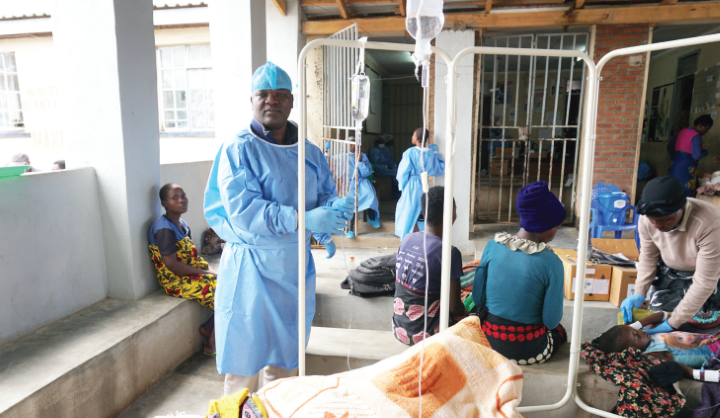Saving girls from early marriages
 Loveness Manda, 16, from Luji Phiri Village in Traditional Authority Chindi in Mzimba was in Standard Eight at Chanyama Primary School until January this year, when she suddenly quit school.
Loveness Manda, 16, from Luji Phiri Village in Traditional Authority Chindi in Mzimba was in Standard Eight at Chanyama Primary School until January this year, when she suddenly quit school.
When her teachers visited her home to establish the cause, her parents told them she had been missing there as well.
It was later learnt that she got married to a man (name withheld) from a neighbouring village. Loveness claims the man, who used to frequent the area , threatened her.
“He told me that if I refused to marry him, he would put a spell on me to follow him to his house. I was afraid of this and I just decided to go to him then,” she says.
News reached Children’s Corner; a local grouping that trains youths with various skills and encourages them to stay in school. It is supported by EveryChild Malawi, Bulala Project.
It is this grouping which rescued her from the marriage.
But why do girls like Loveness rush into marriage?
Keston Ndhlovu of EveryChild at Bulala says there are several factors for this.
The first one, which he says is common, is poverty.
“A girl child feels the pain of poverty in the village and believes that the best way out is to get married. They think they are running away from poverty,” says Ndhlovu.
He adds that some girls are enticed by the money which men flash in exchange for marriage.
“Men go to South Africa to work. When they come back, they have a lot of merchandise and money which prompts young girls to quit school and get married,” says Ndhlovu.
The 2010 Demographic Health Survey (DHS) indicates that the percentage of teenagers who have started childbearing decreases with increasing level of education.
“Forty-five percent of teenagers with no education have already begun childbearing as compared with only 4 percent of those with more than secondary education. Teenagers in the lowest wealth quintile are more than twice as likely to have started childbearing as those in the highest wealth quintile (31 and 16 percent, respectively),” reads parts of the DHS.
Facilitator of the Children’s Corner at Chanyama, Nyuma Redson Mkhalipi, says being quick and alert helped them rescue more girls from early marriages.
“My job is more or less like a youth director and I am made aware of any developments happening to youths here. So, when I heard about Loveness’ marriage, I was shocked and immediately went to work,” says Mkhalipi.
He and his group contacted Loveness’ parents who were equally unhappy about her marriage.
“After learning about the marriage, first, we contacted her parents and then we went to the village where she was living. We explained to her that, at her age, she was not mature enough for marriage,” says Mkhalipi.
He says after convincing the girl to leave her marriage and return home, they now faced the challenge of preparing her for the future.
“We looked at the problems she had at hand and we concluded that [her rush into marriage was motivated by] poverty,” he says.
Unfortunately, Loveness is ashamed to return to school.
“Since she was shy to return to school, we organised vocational training for her,” says the facilitator.
After looking at several options, Loveness chose tailoring. Someone was hired to carry out the training, and Loveness is doing better by the day.
“As a CBO in the area, we are satisfied with her progress. I remember there was a girl who took three months to master the art of tailoring. But with Loveness, only a month was enough,” Mkhalipi says.
As for Loveness, she has vowed never to marry early again, saying she is able to meet most of her needs through tailoring.
“That marriage has taught me something. I will never marry quickly again because I have unfinished business that I want to do,” she says.
This is only one of several activities EveryChild Malawi is supporting in Bulala.
Given Zimba, 17, from Masilikani Village in Traditional Authority Chindi in Mzimba, is another beneficiary.
His father passed away and his mother remarried. This made life tough for him.
“I had no one to look after my needs. I could not even afford soap, my mother stopped to support me. I ended up dropping out of school,” Given says.
Fortunately, he was spotted by EveryChild who, last August, facilitated his vocational training in bricklaying.
Life has now changed for Given. When The Nation met him, he had secured a contract at Bulala Health Centre. He will construct latrines worth K150 000 (about $895).
At Tonthowele Community-Based Centre, EveryChild provided funds for the construction of a shelter for a nursery school, a rare education facility in the villages. Previously, children were learning in a church.
At Bulala Community Day Secondary School, EveryChild is paying school fees for 31 students in various classes, a development that has given hope to those who could not afford the fees.
For Lucius Chadewa, 12, a Form One student from Kanyalu Village in the area, his parents could not afford his school fees.
When he got selected to secondary school, the education committee at Bulala contacted EveryChild for help. Fortunately, the organisation agreed to help.
Every Child country director Brussels Mughogho says his organisation is happy to be involved in various activities in the country.
“Our main focus is on children without parental care and we feel obliged to help students with school fees, nursery services or withdrawing girls from marriage. We are committed to continuing with such programmes,” says Mughogho.
Malawi is one of the 25 countries where Every Child is operating. Apart from Mzimba, the organisation is working in Dowa, Lilongwe and Mangochi.





